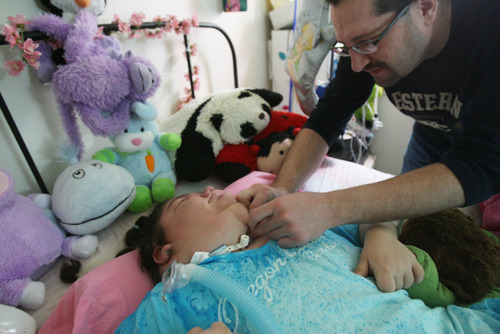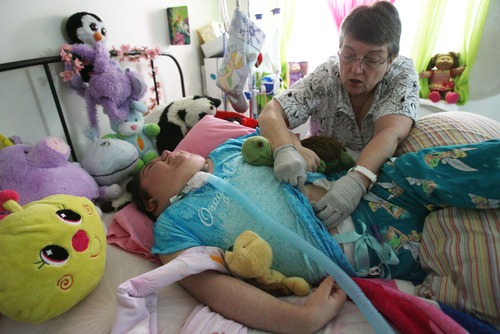This is an archived article that was published on sltrib.com in 2013, and information in the article may be outdated. It is provided only for personal research purposes and may not be reprinted.
At the start of the year, 73 percent of Utah's Medicaid clients — 180,313 Wasatch Front men, women and children — were steered into managed-care plans as part of an experiment intended to improve care and save taxpayers hundreds of millions of dollars.
Most likely didn't notice the change, since all but one of the four plans are run by the same insurance groups that had previously administered Medicaid.
But some were dismayed to learn they'll have to pick new doctors and caregivers, causing disruptions that one mother of a disabled child says could undermine the experiment's success.
"Losing our nurse is like losing a member of our family, our lifeline," said Heather Sowby of Bountiful.
Sowby's daughter, Valerie, qualifies for Medicaid due to her special medical needs. Born with a rare disorder, lissencephaly, Valerie is severely neurologically impaired because her brain didn't form properly. She can't sit up or eat on her own and requires round-the-clock care to keep frequent seizures at bay.
"We were told she wouldn't live longer than a few months," said Sowby.
But this year, Valerie turned 16 — a credit, said Sowby, to Valerie's tough spirit and the skilled care of her night nurse, Brenda Kehoe.
For five years, Medicaid has paid to have Kehoe come to the Sowby's home to monitor and tend to Valerie at night, while the family sleeps.
But the Medicaid plan that Sowby picked on Jan. 1 no longer contracts with the home health company that employs Kehoe.
—
'We ... pledge to be responsive' • The news was a shock to Sowby, who had picked the plan by default.
The Utah Department of Health open-enrollment letter alerting clients to pick a plan simply said, "If you're happy with the services you're getting, ignore this letter. If you want a change, reply for more information," said Sowby, who chose to stick with Intermountain Healthcare's network.
She didn't realize the switch would result in changes in services because the network renegotiated its contract with Intermountain's insurance arm, SelectHealth. Previously the network had been leased by the state, which paid for services as billed.
Under the Medicaid overhaul, managed-care plans take responsibility for a set group of patients for the year. The state pays them a lump monthly sum per patient.
If a plan spends more than allotted for care and prescription drugs, it absorbs the loss. If it spends less, it gets a share of the leftovers, creating an incentive to keep patients healthy and out of the hospital.
After the current legislative session ends in March, the health department will begin crafting new measures for assessing the quality of the care provided by the plans, representatives told the Social Services budget commmittee Monday.
"For those enrolled in [the University of Utah's] HealthyU and Molina Healthcare [plans] the switch wasn't a big deal. But we all should have recognized the big network changes that were occurring for those in the SelectHealth program," said Lincoln Nehring, a health policy analyst at Voices for Utah Children.
State health officials are working with SelectHealth to find remedies for the "few" clients who have complained, said an agency spokeswoman, Kolbi Young.
SelectHealth, meanwhile, is allowing patients to stick with their current providers for six months and pledging to help them find new ones.
"They can call the customer service line on the backs of their cards," said Spencer Sutherland, a spokesman for the insurer. "There are things we're still working through and still learning. ...We're new to the market, but pledge to be responsive to member concerns that come up."
—
'The difference she makes.' • Sowby is thankful for the extra time. She'd prefer to arrange to keep Valerie's nurse, Kehoe.
But she has no legal recourse. Under Medicaid rules, managed-care plans need only guarantee access to services; in this case, another home health nurse.
For someone who is relatively healthy, finding a new provider is a hassle, but for families like the Sowby's it's a life-altering event, said Kehoe. "In terms of changes that cause stress for families, for a special-needs child, I would put it up there with a job change or divorce."
For four nights a week, Kehoe keeps watch over Valerie as Sowby and her now-ex-husband, Anthony, catch some much-needed sleep.
The arrangement enables Sowby to work full-time during the day. Though no longer married to Sowby, she and Anthony continue to live together so he can help care for their daughter.
"We don't know if Valerie's going to have a day where she's awake all night, or having seizures," said Sowby. "People don't understand what it takes to take care of a special-needs child and the sacrifices you have to make. Most people don't think of work as a luxury. To us, it was."
Kehoe knows Valerie's seizure patterns and when to be alarmed by swings in her body temperature, which usually end with a respiratory infection and hospital stay, Sowby said. "She's spared us many a hospital visit."
The nurse hand-crafted special sleeping pads to wick sweat from Valerie's body and sews special shirts that allow for easy access to her feeding tube and oxygen. They exchange gifts on birthdays and Christmas.
"She takes care of her like she's her own daughter," said Sowby. "That in itself makes such a difference. You can't measure the difference she makes to Valerie's quality of life and to our quality of life."
@kirstendstewart —
Medicaid managed care plans
Intermountain Healthcare's SelectHealth is the largest Medicaid managed-care plan in Utah. Here's how the four plans rank by enrollment:
SelectHealth: 76,096
Molina Healthcare: 61,671
University of Utah's Healthy U: 41,849
Altius' Health Choice Utah: 697







